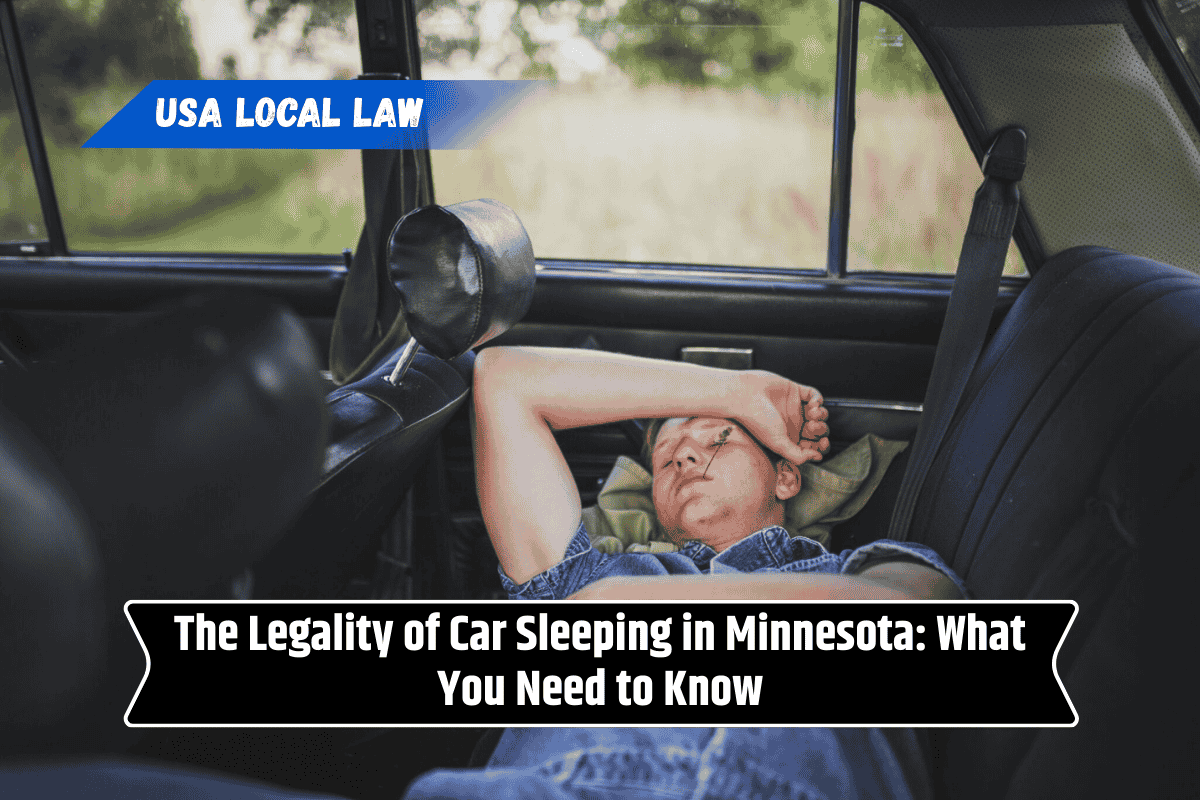Sleeping in your car might seem like a simple and convenient option, especially when you’re on a road trip or need a place to rest.
However, in Minnesota, as in many other states, there are certain laws and regulations to be aware of before deciding to sleep in your car. Here’s what you need to know about the legality of car sleeping in Minnesota.
1. Is It Legal to Sleep in Your Car in Minnesota?
In general, it is not illegal to sleep in your car in Minnesota. However, the legality largely depends on where you choose to park and sleep. There are no statewide laws specifically prohibiting sleeping in your vehicle, but local ordinances and property rules can affect your ability to rest in your car.
2. Where Can You Sleep in Your Car?
While it’s not illegal to sleep in your car, it’s important to make sure you’re parked in a legal and safe spot. Here are some common places where car sleeping may be permissible:
Rest Areas: Minnesota’s Department of Transportation (MnDOT) allows drivers to stop at designated rest areas for short periods, including for sleeping. These areas are typically intended for short stops to rest and take breaks from driving.
Campgrounds: Some campgrounds allow people to sleep in their vehicles, particularly those that offer amenities for RVs and tents. These campgrounds usually charge a fee and have designated spaces for car sleeping.
Private Property: If you park on private property with permission (such as a friend’s or family member’s driveway), it is generally legal to sleep in your car. However, be sure to have the owner’s consent to avoid trespassing.
3. Public Parking Lots and Street Parking
In most cases, sleeping in your car in public parking lots or on the streets is not allowed, especially overnight. Many cities have local ordinances that prohibit parking overnight in public areas, including street parking or commercial parking lots. Violating these rules can result in a fine or having your car towed.
Minneapolis: In Minneapolis, overnight parking on the street is generally prohibited, and sleeping in your car can lead to fines or towing if you’re parked in an unauthorized location.
Other Cities: Many cities across Minnesota have similar restrictions. Always check local parking rules before deciding to sleep in your car.
4. Homelessness and Car Sleeping
For people experiencing homelessness, sleeping in a car may be necessary, but it can be legally complicated. While there is no law specifically banning sleeping in your car, some local ordinances may restrict it.
In some cities, this may be enforced as a way to manage public spaces and ensure safety. Many cities provide services for homeless individuals, and local shelters may be a safer and more legal alternative for those in need.
5. Safety and Comfort Concerns
While the legality is one aspect, safety and comfort should also be considered when sleeping in your car:
Safety: Choose a well-lit, safe area to park. Rest areas, certain campgrounds, or even 24-hour businesses (with permission) are often the safest spots for car sleeping.
Comfort: Depending on the time of year, sleeping in your car in Minnesota can be uncomfortable, particularly in the winter. The state experiences harsh winters, and sleeping in a vehicle during cold months can be dangerous due to freezing temperatures.
Always make sure you have proper bedding and warm clothing if you plan to sleep in your car during winter.
6. Excessive Parking Violations and Public Disturbance
If your car is parked for extended periods or causes a disturbance (such as loud noise or blocking access), local law enforcement may take action. Cities in Minnesota may also have rules about the number of consecutive hours a vehicle can remain parked in one spot.
Additionally, if you are sleeping in your car and receive complaints from neighbors or passersby, you could be asked to move or face fines, especially if you’re parked in an area where parking is restricted.
7. Sleeping in Your Car at Gas Stations or 24-Hour Stores
Gas stations and 24-hour businesses might allow people to sleep in their cars overnight, especially if they are located along highways or in rural areas.
However, this is often at the discretion of the business owner or manager, so it’s important to ask for permission before settling in for the night. Without permission, you could be trespassing, which could lead to fines or being asked to leave.
8. Impact of Car Sleeping on Your Insurance
If you’re sleeping in your car and something happens—whether it’s an accident or theft—your car insurance policy may still cover the incident, as long as it’s within the terms of the policy.
However, if you are violating local ordinances by parking in an unauthorized spot, your insurance company could potentially refuse to cover damages.
In Minnesota, sleeping in your car is not automatically illegal, but you need to be mindful of where you park and local regulations. While rest areas, campgrounds, and private property (with permission) are acceptable places to sleep, parking in public or commercial areas can lead to fines or towing.
Always check local ordinances, seek permission where necessary, and prioritize your safety, especially in the state’s extreme weather conditions.
